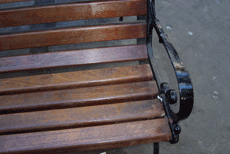
 |
 
Site Furnishings and Amenities for Governments and Institutions
 
When tall wooden ships became obsolete, ships’ carpenters fashioned the first teak benches from salvaged timbers, and a tradition was born. Unfortunately, this colonial use of tropical hardwoods has been passed on to towns and cities throughout Europe and the US and has become one of the most widespread uses of rainforest wood. While the use of tropical woods in outdoor benches has a long history, governments and corporations need no longer follow this old trend and can instead avail themselves of more cost-effective, high-tech and stylish materials. Rainforest woods most often used in site furnishings include tropical woods such as teak, ipê, greenheart, ekki, cumaru and temperate rainforest woods such as western red cedar, redwood, Alaskan cedar and Douglas fir. As well, cypress from the southern US and jarrah from Australia are two other common old growth woods. For information on these particular woods, see the By Species subsection. All tropical and temperate rainforest woods should be avoided for outdoor furniture, unless the wood is from second growth logging and carries independent certification accredited by the Forest Stewardship Council. But don’t be fooled by companies that tout their chain-of-custody (CoC) certification only. While this is an essential part of a company’s ability to sell FSC-certified wood or products, it is not an assurance that the wood or product is certified. CoC certification gives a company the ability to sell certified wood or products and use the FSC name and logo. But you must also ask to see the certificate for the producer of the wood or product. Further, even FSC certified tropical hardwoods should be avoided if they originate from old growth operations. Even so-called certified logging in old growth has been shown to have a negative impact on forest ecology and biodiversity. Well-managed logging may work in temperate regions but tropical rainforests are orders of magnitude more diverse and therefore much more fragile than any temperate ecosystem. Commercial logging in old growth tropical forests is simply not acceptable. Recycled plastic lumber is the smart material of choice for outdoor benches. But steel benches are also readily available and will last far longer than wood. Companies to Avoid The following companies are selling uncertified rainforest wood outdoor furniture. Kingsley Bates Landscape Forms Victor Stanley DoMor Site Furnishings Westminster Teak Dobra Design Smith & Hawken Sitecraft The Park Catalog Kenneth Lynch & Sons Kevin G. Lindelow Albert Forest Products Fairweather Barlow Tyrie Country Casual Frances Andrew Send a message to companies selling rainforest wood outdoor furniture. Alternatives Many alternatives for outdoor furniture exist. Typically steel is long-lasting, however, not the best choice for rainforests. Also, the coatings that prevent it from rusting may be detrimental to produce. Certain woods can be used that no longer originate from endangered forests. These include eastern white cedar and second growth western cedars (Western red cedar, yellow cedar) and redwood. However, without FSC-accredited certification and knowledge that the wood is originating from second growth (it's easy to tell based on the grain), redwood, yellow (Alaskan) cedar, Douglas fir and western red cedar should be avoided. White oak is an excellent choice for outdoor furniture. White oak heartwood is classified as highly durable by the US Forest Products Laboratory. Robinson Iron sells site furnishings with white oak slats. The most environmentally preferable alternative is recycled plastic. This should last far longer than any wood and is made from materials saved from the landfills. There are a number of companies selling recycled plastic site furniture. Urbain Design Barco Products Trimax Building Products Plastic Lumber Yard Dobra Designs Upbeat, Inc. Although Upbeat has a couple of benches available with redwood slats, we've put them on the green list. For their large selection of recycled plastic benches, click here. Miracle Play Equipment sells site furnishings made from recycled plastic and also steel. Companies In Between Victor Stanley, mentioned above, also produces recycled plastic lumber site furnishings, however, we're calling for a boycott of this company until they end their sales of tropical hardwoods. The Park Catalog, mentioned above sells recycled plastic lumber site furnishings, however, they also sell some redwood. If you're looking for wooden benches, The Park Catalog also sells oak, a sustainable wood logged from second-growth forests in the US. Click these links for the following alternatives: The Park Catalog recycled plastic benches. The Park Catalog recycled plastic bike racks. The Park Catalog recycled plastic trash recepticles. The Park Catalog oak bench. Equipark sells benches and other site furnishings, making them available in reycled plastic but also ipê, jatoba and "select hardwoods". Rainforest Relief has begun working with Kenneith Lynch & Sons, who sells benches made with ipê but also makes recycled plastic lumber available. We are working with them to make black locust, a sustainable, local and highly durable domestc hardwood, available for benches. Stay tuned to learn more about that effort. For now, if you buy from Kenneith Lynch & Sons, buy only recycled plastc lumber. While you're on these companies' sites, please send them a message asking them to end their sales of wood from endangered rainforests. |
 |
 |
|||||||||||||||||
 Copyright 2006 Rainforest Relief |
||||||||||||||||||||
